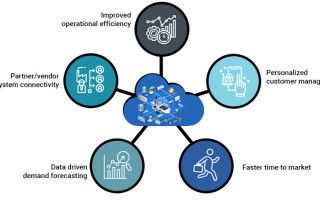
The world of technology is constantly evolving, and cloud computing has emerged as a game-changer in recent years. With its ability to provide scalable, flexible, and cost-effective solutions, it has revolutionized the way businesses operate. Cloud computing has gained immense popularity across various industries, enabling organizations to optimize their resources and streamline their workflows.
What is Cloud Computing?
Cloud computing refers to the delivery of computing services such as storage, databases, software applications, and more over the internet. Instead of relying on local servers or personal devices for data storage and processing, cloud computing allows users to access and utilize these resources remotely. The cloud infrastructure ensures that data is stored securely and can be accessed from anywhere, at any time, using any device with an internet connection.
The Benefits of Cloud Computing
There are numerous advantages associated with embracing cloud computing for businesses:
1. Increased Flexibility and Scalability
Cloud computing provides businesses with the flexibility to scale their computing resources up or down as needed. Whether there is a sudden spike in demand or a decrease in workload, the cloud infrastructure can easily handle the changes. This flexibility enables organizations to be agile and efficient, ensuring resources are allocated optimally.
2. Cost Efficiency
Traditional IT infrastructure often requires significant upfront investment, including hardware, software licenses, and maintenance costs. Cloud computing eliminates these expenses by offering a pay-as-you-go model. With the ability to provision resources on demand, businesses only pay for what they use. This cost-effectiveness allows organizations to allocate their IT budgets efficiently and invest in other areas of growth.
3. Enhanced Collaboration and Productivity
Cloud computing promotes seamless collaboration among team members, regardless of their physical location. With cloud-based software and storage solutions, individuals can collaborate in real-time, share documents, and edit simultaneously. This level of collaboration enhances productivity and streamlines workflows, enabling teams to work cohesively on projects, irrespective of distance and time zones.
4. Improved Security and Reliability
Security is a top priority for any business, and cloud computing offers robust security measures to protect data. Cloud service providers implement advanced encryption techniques, firewalls, and regular backups to safeguard sensitive information. Moreover, cloud infrastructure ensures high availability and reliability, minimizing the risk of data loss due to hardware failures or disasters.
5. Simplified IT Management
With cloud computing, businesses can minimize the complexities associated with managing IT infrastructure. Cloud service providers handle aspects such as hardware setup and maintenance, software updates, and security patches. This allows organizations to focus on their core competencies without worrying about IT management, ultimately increasing operational efficiency.
The Future of Cloud Computing
As technology continues to advance, cloud computing is anticipated to play an even more significant role in reshaping the way we work. The future of cloud computing looks promising, with innovations like the Internet of Things (IoT), edge computing, and artificial intelligence (AI) integration. These advancements will expand the capabilities of cloud computing, offering even more opportunities for businesses to leverage technology for their growth and success.
Cloud computing has proven to be a transformative force in the tech world, revolutionizing the way businesses operate and optimize their resources. The flexibility, cost efficiency, collaboration capabilities, security, and simplified IT management provided by cloud computing have become essential elements for organizations across industries. Embracing the cloud is not just a trend but an imperative step towards staying competitive in today’s fast-paced digital landscape.
Read more on the YourTechBlog


